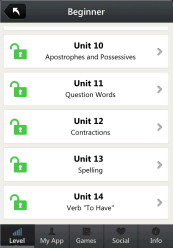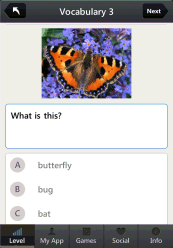English Grammar - Elementary
Present Continuous Structure
Go To Quizzes >>> Present Continuous
The present continuous is easy to form. We use the verb "to be" plus the verb in the ____ing form.
For example:
He is swimming in the river.
They are talking about their holiday.
Here is the verb talk conjugated in the present continuous.
| Present Continuous | ||
|---|---|---|
| Positive | Negative | Question |
|
I am talking You are talking He is talking She is talking It is talking We are talking You are talking They are talking |
I'm not talking You're not talking He isn't talking She isn't talking It isn't talking We aren't talking You aren't talking They aren't talking |
Am I talking? Are you talking? Is he talking? Is she talking? Is it talking? Are we talking? Are you talking? Are they talking? |
Note. There are certain spelling changes when verb are put into the continuous form:
Consonants after a vowel are doubled.
get - getting
swim - swimming
Final "e" is dropped.
love - loving
type - typing
Exceptions to these two rules.
A word of more than one syllable with the first syllable stressed does not double the consonant.
visit - visited NOT doubled as first syllable is stressed.
prefer - preferred IS doubled as second syllable is stressed.
be - being final "e" is NOT dropped.
Present Continuous Use
Go To Quizzes >>> Present Continuous
The Present Continuous is used to describe an action that is going on at this moment, at the time of speaking.
You are using your computer to study the internet.
You are sitting on a chair at the moment.
It is also used to describe an action that is going on during this period of time but not necessarily at this exact moment.
I am reading a good book about Polish mushrooms.
She is doing a course in flower arranging at the local arts centre.
We can use the Present Continuous to describe an action or event in the future, which has already been planned or prepared. You should see here for more information on that on this page.
We can use this tense also to describe a temporary event or situation.
He usually goes to work by bus but this week, he is using the train because there is a strike on the buses.
I am living at my sister's for a month until she has her baby.
Many verbs aren't used in the continuous form
I don't understand what you mean.
NOT I am not understanding....
Verbs like this include: feel, hear, see, smell, taste, believe, consider, doubt, forget, imagine, know, mean, notice, recognise, remember and understand.
English Learning Lounge - iOS and Android Apps |
||

|
Our app for both Android and iOS to help you improve your English!
|

|
Comparatives and Superlatives
Go To Quizzes >>> Comparatives and Superlatives
We use comparative and superlative adjectives when we want to compare and contrast things.
Look:
a) India is a big country.
b) Canada is bigger than India.
c) Russia is the biggest country in the world.
Sentence a) uses the base adjective, sentence b) uses the comparative and sentence c) uses the superlative.
Here is how we form these adjectives:
Comparatives
| For Short Adjectives | Adjectives Ending "__y" | For Long Adjectives |
|---|---|---|
|
Add '-er' Bigger Longer Faster |
Add '-ier' Heavier Prettier Easier |
More/Less ____ More beautiful Less interesting More intelligent |
Superlative Adjectives
| For Short Adjectives | Adjectives Ending "__y" | For Long Adjectives |
|---|---|---|
|
Add 'The -est' The biggest The longest The fastest |
Add 'The -iest' The heaviest The prettiest The easiest |
The Most/Least ____ The most beautiful The least interesting The most intelligent |
Examples:
Madrid is bigger than Lisbon but London is the biggest city in Europe.
Your exam was easier than mine. You are always luckier than me!
There are some irregulars:
Good - Better - The Best
Bad - Worse - The Worst
Far - Further - The Furthest
Tina Turner is not the best singer in the world.
But I am worse than her!
We use "as ____ as" to describe things which are equal:
Rome is as hot as Madrid in August.
I am not paid as much as John as he is more experienced.
She ran as far as possible and then stopped.
We can use other expressions before these adjectives to give emphasis.
She is much taller than her husband.
We spent a bit more than expected.
Julia Roberts is fifty times prettier than my sister.
Los Angeles is quite a lot more polluted than San Francisco
etc, etc.
